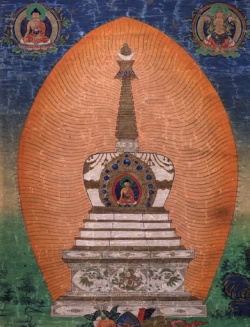Difference between revisions of "Chilupa/Kalachakrapada"
(Created page with " Chilupa/Kalachakrapada There are currently two main traditions of Kalachakra, the Ra lineage (Tib. Rva-lugs) and the Dro lineage (Tib.'Bro-lug...") |
|||
| Line 1: | Line 1: | ||
| − | + | {{DisplayImages|114}} | |
[[Chilupa]]/[[Kalachakrapada]] | [[Chilupa]]/[[Kalachakrapada]] | ||
| Line 5: | Line 5: | ||
There are currently two main [[traditions]] of [[Kalachakra]], the [[Ra lineage]] (Tib. [[Rva-lugs]]) and the [[Dro lineage]] (Tib.'[[Bro-lugs]]). | There are currently two main [[traditions]] of [[Kalachakra]], the [[Ra lineage]] (Tib. [[Rva-lugs]]) and the [[Dro lineage]] (Tib.'[[Bro-lugs]]). | ||
| − | Although there were many translations of the [[Kalachakra]] texts from [[Sanskrit]] into [[Tibetan]], the Ra and [[Dro]] translations are considered to be the most reliable (more about the two [[lineages]] below). The two [[lineages]] offer slightly differing accounts of how the [[Kalachakra teachings]] returned to [[India]] from [[Shambhala]]. | + | Although there were many translations of the [[Kalachakra]] texts from [[Sanskrit]] into [[Tibetan]], the Ra and [[Dro]] translations are considered to be the most reliable (more about the two [[lineages]] below). |
| + | |||
| + | The two [[lineages]] offer slightly differing accounts of how the [[Kalachakra teachings]] returned to [[India]] from [[Shambhala]]. | ||
The [[Dro lineage]] was established in [[Tibet]] by a [[Kashmiri]] [[disciple]] of [[Nalandapa]] named [[Pandita Somanatha]], who traveled to [[Tibet]] in 1027 (or 1064CE, depending on the [[calendar]] used), and his [[translator]] [[Droton Sherab Drak Lotsawa]], from which it takes its [[name]]. | The [[Dro lineage]] was established in [[Tibet]] by a [[Kashmiri]] [[disciple]] of [[Nalandapa]] named [[Pandita Somanatha]], who traveled to [[Tibet]] in 1027 (or 1064CE, depending on the [[calendar]] used), and his [[translator]] [[Droton Sherab Drak Lotsawa]], from which it takes its [[name]]. | ||
| − | The [[Ra lineage]] was brought to [[Tibet]] by another [[Kashmiri]] [[disciple]] of [[Nadapada]] named [[Samantashri]], and translated by | + | The [[Ra lineage]] was brought to [[Tibet]] by another [[Kashmiri]] [[disciple]] of [[Nadapada]] named [[Samantashri]], and translated by [[RaChoerab Lotsawa]] (or [[Ra Dorje Drakpa]]). |
Today [[Kalachakra]] is practiced by all four [[Tibetan]] [[schools of Buddhism]], although it appears most prominently in the [[Gelug lineage]]. It is the main [[tantric practice]] for the [[Jonang school]]. | Today [[Kalachakra]] is practiced by all four [[Tibetan]] [[schools of Buddhism]], although it appears most prominently in the [[Gelug lineage]]. It is the main [[tantric practice]] for the [[Jonang school]]. | ||
| + | {{R}} | ||
| + | [http://www.gemsofyogadubai.com/index.php?option=com_content&view=article&id=21&Itemid=117] | ||
| + | [[Category:Kalachakrapada]] | ||
Revision as of 09:39, 29 October 2015
There are currently two main traditions of Kalachakra, the Ra lineage (Tib. Rva-lugs) and the Dro lineage (Tib.'Bro-lugs).
Although there were many translations of the Kalachakra texts from Sanskrit into Tibetan, the Ra and Dro translations are considered to be the most reliable (more about the two lineages below).
The two lineages offer slightly differing accounts of how the Kalachakra teachings returned to India from Shambhala.
The Dro lineage was established in Tibet by a Kashmiri disciple of Nalandapa named Pandita Somanatha, who traveled to Tibet in 1027 (or 1064CE, depending on the calendar used), and his translator Droton Sherab Drak Lotsawa, from which it takes its name.
The Ra lineage was brought to Tibet by another Kashmiri disciple of Nadapada named Samantashri, and translated by RaChoerab Lotsawa (or Ra Dorje Drakpa).
Today Kalachakra is practiced by all four Tibetan schools of Buddhism, although it appears most prominently in the Gelug lineage. It is the main tantric practice for the Jonang school.
